Egypt Travel Guide 2023
For most who visit Egypt, the pyramids and tombs of the ancient pharaohs are by far the biggest draw, but the northeast African country offers a great deal more.
Beaches, scuba diving and the mighty River Nile deliver memorable holiday experiences, while the pulsating metropolis of Cairo is ideal if you love the vibrant city life.
Here's our ultimate travel guide for Egypt...
When is the best time to visit Egypt?
The most pleasant temperatures are from October to April, but December to January is considered peak tourist season.
Do I need a Visa to travel to Egypt?
British passport holders can travel to Sharm el-Sheikh, Taba, Dahab or Nuweiba without the need for a visa. If you intend to travel out of these areas or stay longer than 15 days, you must get a visa.
Where to visit in Egypt?
Cairo
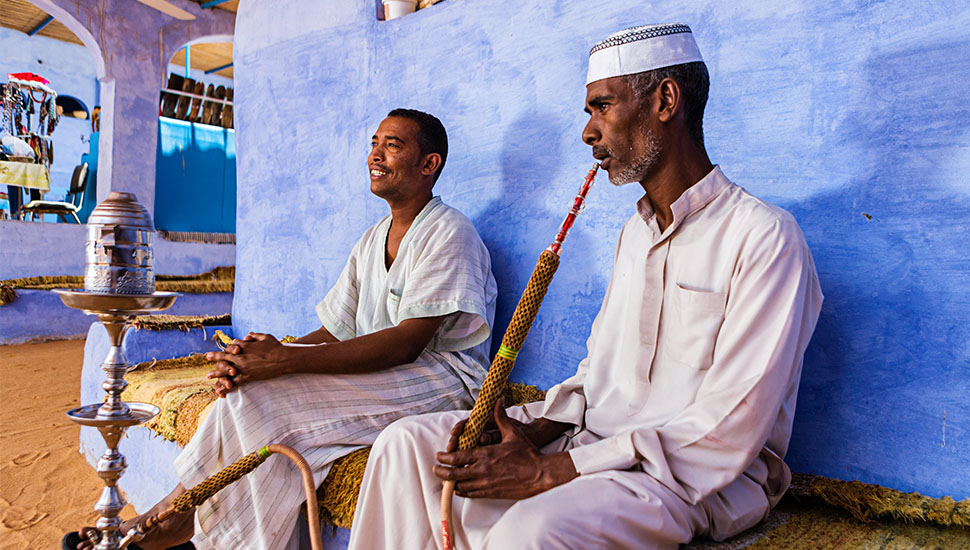
If you're used to life in a UK city, arriving in Cairo will be a big surprise. You'll probably either love or hate the sheer chaos of the place, which offers stunning architecture and heavy congestion in equal measure.
What about getting a Visa for my trip to Cairo?
As a UK citizen you can obtain a 'visa on arrival' - so you don't need to worry about arranging a visa beforehand (although you must for trips exceeding one month).
The visa is a little stamp they put in your passport costing $25. This allows you to stay for up to 30 days.
Make sure you have Dollars or Euros to pay for this.
Should I book a guided tour group for my Cairo, Egypt trip?
Not everyone likes joining a tour group, but in Egypt it might be worth it. Not for any safety reasons, but because many Egyptians will, quite frankly, attempt to rip you off. There are many ways this could happen, making your trip potentially stressful.
Using a reputable Western tour company will help you relax and enjoy Cairo - and Egypt in general.
Top attractions in and around Cairo
Pyramids of Giza
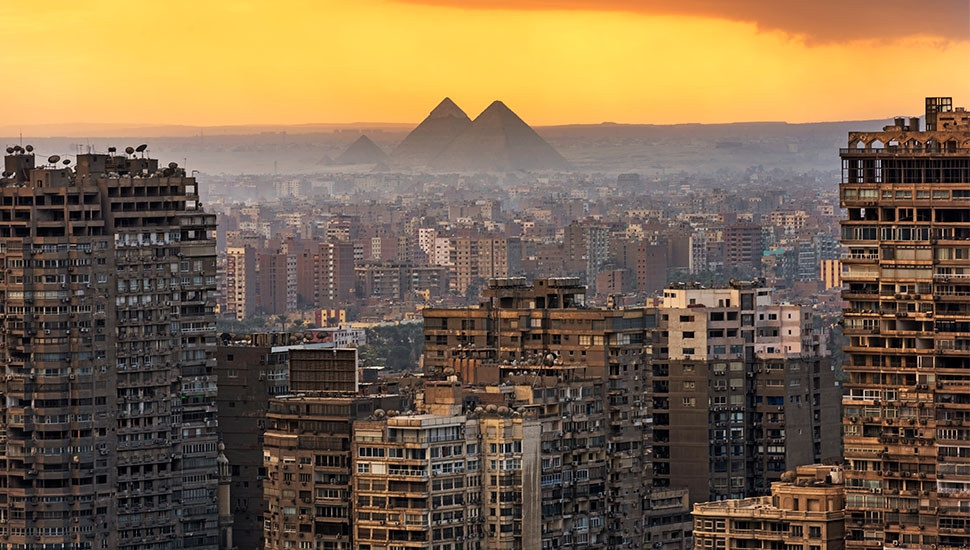
The last surviving wonder of the ancient world, the Pyramids of Giza are a must-see - unless you're visiting Egypt for a beach break.
Mysteries still surround the pyramids and the pharaohs: why did they build these incredible structures? And how?
Take a camel ride and observe ride and observe the engineering miracle of the Great Pyramids of Giza in true Egyptian style.
Egyptian Museum
A must visit when in Cairo, explore the treasures of Tutankhamun and other legendary pharaohs at the Egyptian Museum.
Expect to see mummies, jewellery and everyday items of people now lost to the sands of time.
Khan el-Khalili
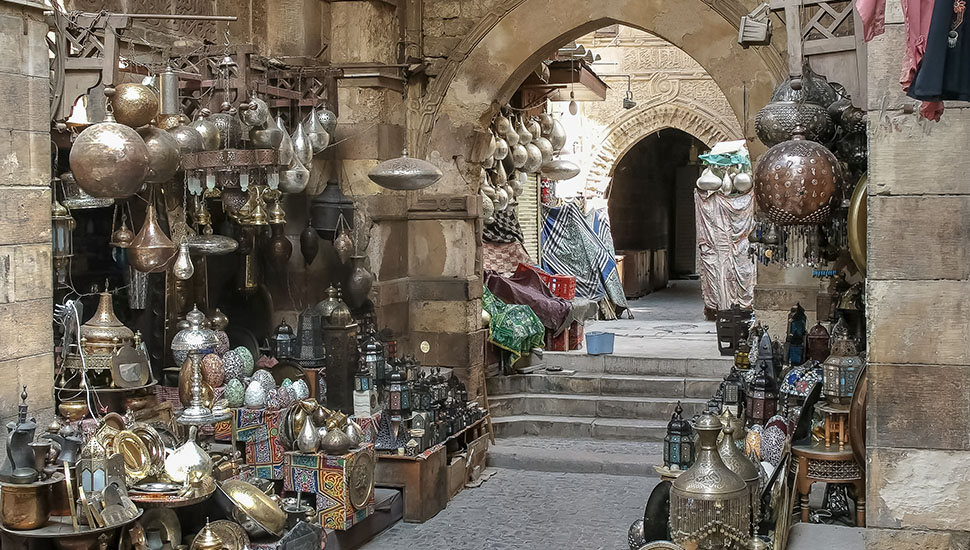
Get ready to haggle - hard.
Khan el-Khalili is a labyrinth of shops and stalls set around small courtyards.
You can buy everything from tacky souvenirs to semi-precious stones.
Coptic Museum
Peruse stunning Coptic art from the earliest days of Christianity in Egypt.
You should set aside at least a couple of hours during your Cairo trip for a visit to the Coptic Museum.
Mosque of Muhammad Ali
Of all Cairo's mosques, this is arguably the most magnificent.
Visible from across the city, it is tourist friendly and allows cameras.
Al-Azhar Park
When the chaos of Cairo gets too much, head to the park. Al-Azhar Park is the largest and finest - the green lungs of Cairo.
Relax, get away from the traffic and enjoy some superb city views.
Valley of the Kings, near Luxor
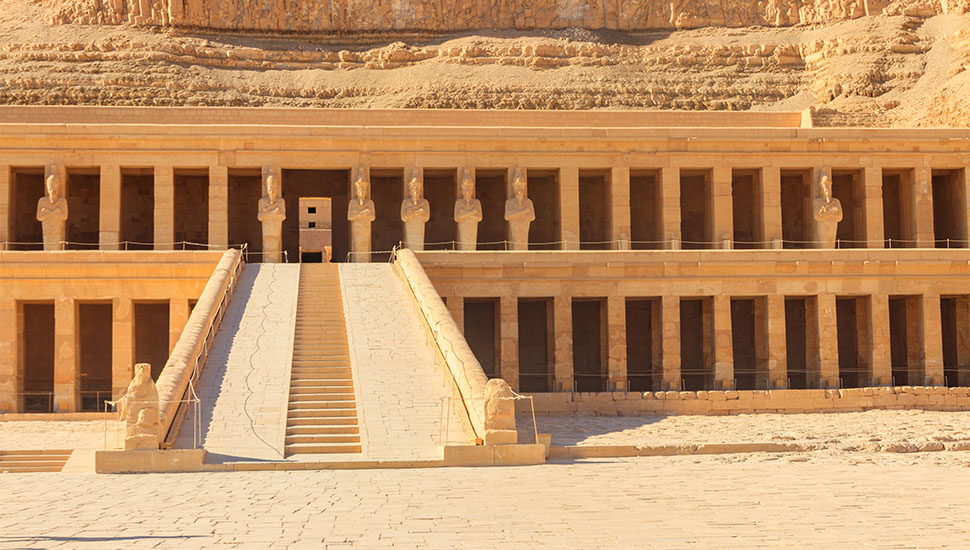
An eight-hour drive south of Cairo, Luxor is another must-see location, chiefly because from here you can visit the Valley of the Kings.
The Valley of the Kings consists of two valleys, the East Valley and the West Valley. The majority of the tombs are located in the East Valley.
From the 16th to the 11th century BC, the kings of the "New Kingdom" were buried here in a series of tombs.
Most tombs are not open to the public, but currently the following can be visited:
- KV1- Ramesses VII
- KV6- Ramesses IX
- KV8- Merneptah
- KV9- Ramesses V & VI - extra ticket required
- KV11- Ramesses III
- KV14- Twosret-Setnakhte
- KV15- Seti II
- KV16- Ramesses I
- KV17- Seti I - extra ticket required
- KV47- Siptah
- KV62- Tutankhamun - extra ticket required
it's important to note that tombs in the Valley of the Kings close periodically and are swapped with other tombs, so those that are open at the time of your visit to Egypt may differ to those listed above.
Visitors are expected to file through the tombs in silence, rather than stop and hear lectures from guides as they once did. This is to better preserve the tombs.
You can expect to see dark, spooky chambers and stunning images and texts rendered on the ancient walls.
Egypt beach holidays
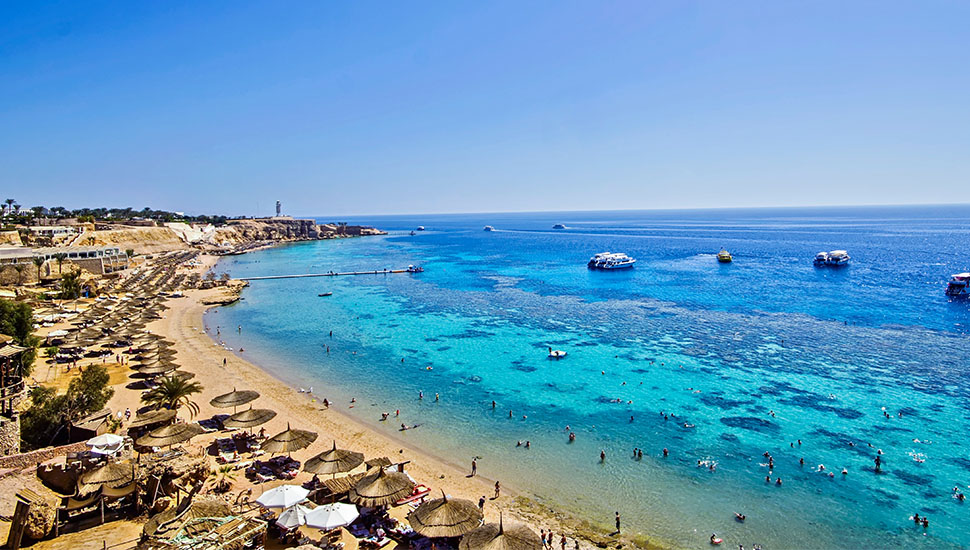
Many people head to Egypt for its glorious beaches.
There are many superb beaches to explore, including those of Mahmya Island (where you can enjoy scuba diving in Giftun Island National Park); the upmarket beach resort of Soma Bay; and the azure-blue waters of Agiba Beach, Marsa Matruh.
If you're taking a beach break in Egypt, you'll likely fly into Hurghada airport, from where the most popular beach resorts are within easy reach.
Nile cruises
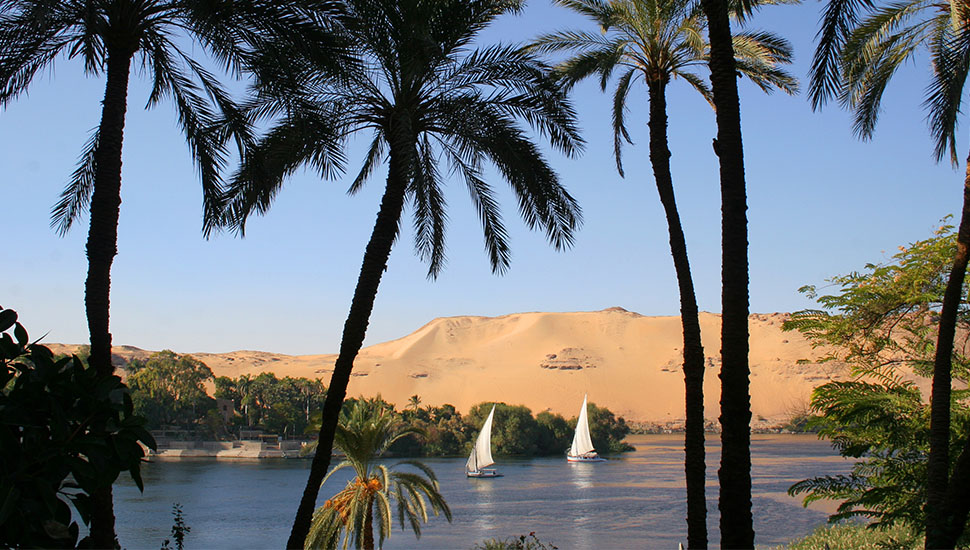
Taking a cruise on the Nile is also considered a must-do on a trip to Egypt.
Pencil in a few days to enjoy the stunning light of the Nile Valley.
Most cruises depart from Luxor and conclude in Aswan, but other trips are available.
Nile cruise options
‘Dahabiyyas' offer a luxurious cruise experience: large, traditional boats that evoke the adventurers of the 19th century.
For a simpler (cheaper) experience, try a traditional open-top ‘felucca' sailing boat. The stretch between Luxor and Nasser gets particularly congested.
If you want to keep away from thronging tourists, try a cruise on the tranquil Lake Nasser.
Is Egypt safe?
Most visits to Egypt are trouble free. However, The Foreign and Commonwealth office warns that terrorist attacks are "very likely" and that visitors should "avoid crowded places and gatherings, including in or around religious sites and during religious festivals, such as the month of Ramadan and the Christmas period (including Coptic Christmas), when terrorist groups have sometimes called for attacks."
The FCO advises against all travel to the Governorate of North Sinai and within 20km of the Egyptian and Libyan border.(excluding the town of El Salloum where the advises against all but essential travel).
The FCO also advises against all but essential travel to Governorate of South Sinai, the eastern part of Ismailiyah governorate east of the Suez canal, the area west of the Nile Valley and Nile Delta regions, excluding:
- the Governorate of Faiyum
- the coastal areas between the Nile Delta and Marsa Matruh
- the Marsa Matruh-Siwa Road
- the oasis town of Siwa
- the Giza Governate northeast of the Bahariya Oasis
- the road between Giza and Farafra, and within 50km either side of this road (not including the road between Bahariya Oasis and Siwa).
- the road between Al Bawiti to Siwa
- the Hala’ib Triangle
- the Bir Tawil Trapezoid